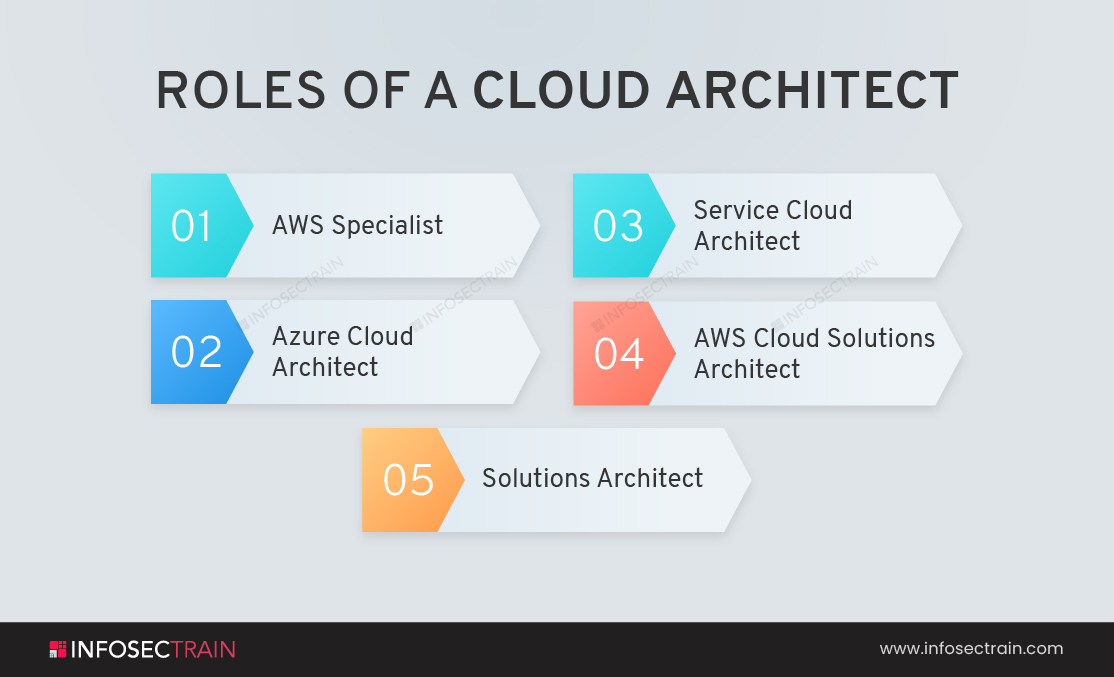Top Roles and Responsibilities of a Cloud Architect
A Cloud Computing Architecture can be defined as the components and subcomponents involved in the process of cloud computing. A front-end platform, back-end platforms, cloud-based delivery, and a network are the most common components. These elements come together to form the cloud computing architecture. The design of cloud systems is based on architectural techniques and methodologies established over the past 20 years.

Why Cloud Architect?
Cloud Architects are in high demand worldwide, because of the increased focus on cloud computing and infrastructure in recent years. For greater scalability, mobility, and security, many businesses have switched to cloud platforms, and Cloud Solutions Architects are among the highest-paid IT specialists. A Cloud Architect is in charge of translating a project’s technical specifications into the architecture and design that will eventually drive the final result. Cloud Architects are frequently in charge of bridging the gap between complicated business challenges and cloud-based solutions.
Roles of a Cloud Architect
A Cloud Architect creates and maintains the cloud computing architecture that all organizations require in order to be flexible as well as adaptable. The cloud architect is the person who has the expertise and skills to design cloud solutions that meet and surpass the organization’s needs. In today’s corporate world, the cloud is prevalent, and due to Cloud Architects, more and more businesses are realizing their full potential.
While the Cloud Architect will be working with cloud architectures, as the job title indicates, the architect will have a wide range of roles to fulfill. Here are some of the job roles that a Cloud Architect has:

1. AWS Specialist: A cloud expert who spends their time designing secure internet protocols and keeping AWS security services and features up to date is known as AWS Specialist.
2. Azure Cloud Architect: An IT expert who assists in the design, implementation and management of an Azure cloud environment is known as Azure Cloud Architect.
3. Service Cloud Architect: The entire cloud computing services and solutions that are deployed in and across the limits of a corporate business network are defined by the Service Cloud Architect. The person in charge is in charge of diagnosing, analyzing, designing, deploying, and integrating cloud services, allowing enterprises to run their operations in the cloud. The fundamental business needs are considered by the Service Cloud Architect, who then aligns them with a viable cloud solution.
4. AWS Cloud Solutions Architect: The AWS cloud solutions architect is in charge of implementing and securing AWS technologies. The individual applies his or her knowledge and abilities to assist in the development of sophisticated cloud-based solutions and the migration of existing workloads to the cloud.
5. Solutions Architect: The person who organizes the development effort of a systems solution is known as a solutions architect. The solutions architect is in charge of creating the overarching vision that underpins the proposed solution and transforming that vision into the solution via execution.
Responsibilities of a Cloud Architect
A cloud architect is primarily responsible for an organization’s cloud computing architecture. Their job responsibilities include keeping track of cloud activities, developing and moving applications to the cloud, and specifying computing demands. They also provide advice on how to deal with high-risk situations. It’s a senior-level position that necessitates a unique combination of technical, business, and interpersonal abilities.
- Develop a well-informed cloud approach and monitor the transition.
- Examine cloud apps, hardware, and software on a regular basis.
- Create and manage cloud-based systems.
- Monitor the company’s cloud privacy in collaboration with IT security.
- Respond to technical difficulties in a timely and competent manner.
- Assist with infrastructure migration strategies, such as mass application transfers to the cloud.
- Identify the best cloud architecture options to help the firm accomplish its strategic goals.
- Translating project-specific requirements into a cloud structure that meets those requirements, as well as taking into account the project’s resource use and scalability requirements.
- Designing the cloud environment from a comprehensive perspective, ensuring that it satisfies all of the company’s needs.
- Performing activities such as deployment, maintenance, monitoring, and management inside the cloud framework that has been created.
- Ensuring cloud security.
- Bringing new apps into the cloud environment to completion.
- Provide training and assistance to all employees whose jobs need them to interact with the cloud structure.
- Keeping track of how much cloud space is being used and ensuring that the system is running smoothly.
- Working with corporate clients to understand their requirements and put in place cloud solutions to satisfy those requirements.
- Conducting migrations to transfer tools and other aspects into the cloud, as needed.
- Using virtualization technologies to accomplish effective server administration for the business.
Cloud Architect with InfosecTrain
Training improves your knowledge and develops your foundation in any topic, therefore choosing the right training provider is crucial. You should check to see if the training center has been approved and recognized by reputable organizations or certification agencies. We have incredibly well-versed trainers at InfosecTrain who have earned experience in various domains. We are a premier training company with a global reputation. So, begin your preparations by enrolling in Infosec Train’s Cloud certification training courses.





 1800-843-7890 (IN)
1800-843-7890 (IN) sales@infosectrain.com
sales@infosectrain.com
 1800-843-7890 (India)
1800-843-7890 (India) 
